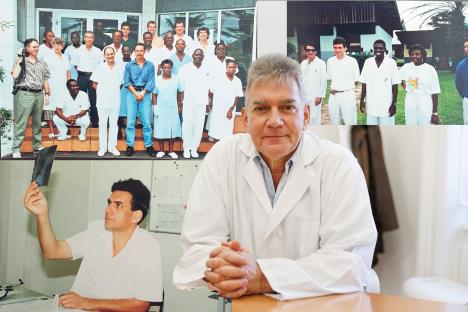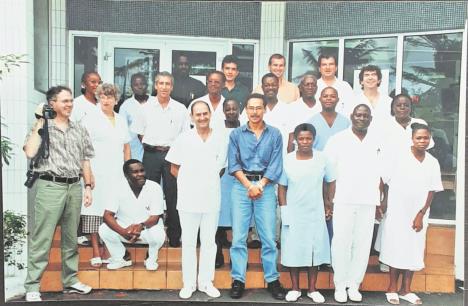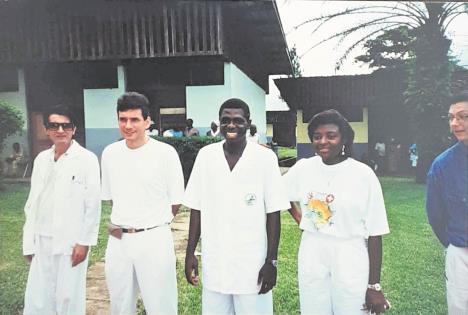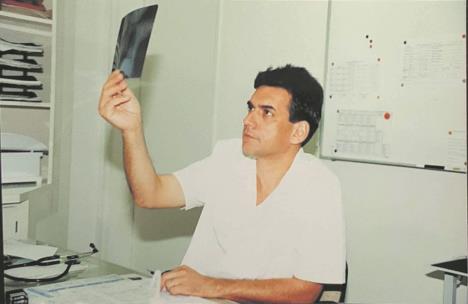DR DRAGAN WENT TO AFRICA FOR 6 MONTHS, STAYED 25 YEARS: He treated people in Gabon, and now he treats homeless in Belgrade!

"I spent 25 years working as a doctor in the African country of Gabon, in the city of Lambaréné. There, I experienced some unpleasant things, but not from people, but from nature and animals.”
Retired medical doctor Dragan Milovanović (71), an internist nephrologist, who has been volunteering for a year at the Religious Charity Guardianship (RCG) of the Archbishopric of Belgrade-Karlovac, begins his conversation with Kurir with these words. There, he helps and treats the homeless and those in difficult material situations.

Born in Athens, he often moved as a child due to his parents' duties, completed the Tenth Belgrade Preparatory School, but also studied in Russia. He finished his medical studies in Belgrade, after which he started working at the Clinical Hospital Centre Zvezdara. He was mobilized and sent to Croatia.
"Even during my studies, I read Politikin Zabavnik and came across an article about Dr Albert Schweitzer, who won the Nobel Peace Prize in 1954. He founded a hospital in Africa and treated leprosy patients. That stayed with me. Years passed, I finished my studies... I believed that my dream of going to such an unusual environment would come true," Dr. Milovanović recalls.

By chance, he heard that a hospital in Gabon was looking for doctors with knowledge of the French language.
"I went there in 1993. I had a six-month contract, but I stayed for 25 years. The hospital was run by a foundation that included Swiss, French, German, and American nationals. The city is called Lambaréné, on the banks of a long and very wide river. For a while, I was also the director of that hospital. In fact, we were employed in Switzerland," Dr Milovanović reminisces.

He also states that Gabon is one of the countries rich in oil, diamonds, uranium, and gold. Like everywhere, there are rich and poor, but he was impressed by how much people help each other:
"In the meantime, I received an offer for another job, accepted it, and later opened a private clinic in another city. I love that country; for me, it was paradise on earth."

When he retired, he returned to Serbia.
"I always wanted to come back here; that was never in question," says Dr Milovanović.

He was also involved in humanitarian work in Africa, treating people who lived in tribes, and he continues to do good deeds here.
"I saw a report about the Charity Guardianship and church kitchen and came to ask if they needed a volunteer doctor. People who come here have difficult life stories, and besides being a doctor, they see support in me. Some have been abandoned by their children, some have become estranged from their loved ones, there are homeless people... There are also our doctors from the Military Medical Academy who volunteer, as well as those from the Clinical Centre of Serbia. Each of us contributes in our own way," he says and emphasizes that the RCG is of great importance to these people.

In 1992, Dr Milovanović spent some time in Kosovo and Metohija, in a hospital in Priština, because Albanian doctors were on strike:
"There were doctors from Belgrade, Niš, Rožaje, Raška. I saw some shocking things there. The hospital was neglected; people were lying without bedding. I remember one man feeling very bad; he was lying on the floor on those stretchers. I asked what was happening, and their doctor said that this man had dialysis scheduled for the next day. However, I saw that he was getting worse. I immediately put him on dialysis. With one nurse, I saved that man. The next day he approached me with a smile, but I see that our people look at me strangely. We cannot let a man die - in Belgrade, no one has ever been rejected because of their nationality."
M. B.